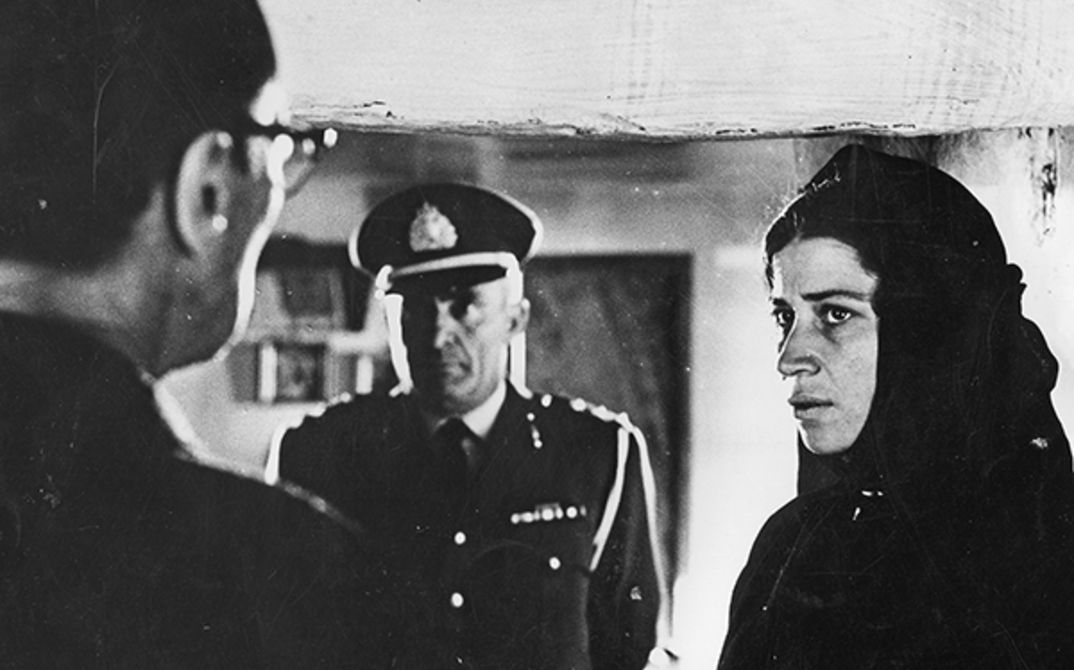Interview with Theodor Angelopoulos: Prerequisites, intentions
(…) I was interested in the story because this was not the first time I read in the newspaper that a Greek woman had killed her husband. In the Epirus region, the most underdeveloped in Greece, it was fairly common. I drove there and conducted research as a journalist. I spoke with the people in the village, with the brothers of the murderess, her children and her attorney. The attorney gave me the court documents. Using this material, I wrote the script. Of course, the murder serves me solely as the inciting incident for a report on a Greek village in this region.
Since I didn’t commit this murder and also wasn’t a witness, but just someone who came from the city, I didn’t think it would be very honest to relate the events in the form of a fiction, the way Visconti did in OSSESSIONE, for example, which is a film with almost the same plot. I wanted to attempt a double reconstruction, i.e. a reconstruction of the facts as they were told to me or as I read them in the court documents, and also a reconstruction of the type the police carry out with the guilty parties. The film functions on these two levels: on the level of the police’s reconstruction of the events, and of my reconstruction in the form of interrogations. The film shifts back and forth between these two levels, without giving rise to a logical continuity. The film thus ends, for instance, with a scene that should have been at the beginning: the murder. But it’s the murder as it appears from the outside.
Florian Hopf: But it didn’t really interest you as a criminal case...
No, not in the least. What interested me was the gradual death of a region, a process that can be extended to the whole of Greece. (…)
You were interested in the story of this economically poor region, in its social structures...?
They don’t even exist. There are no social structures at all, because there aren’t any economic relations, either. The village lives entirely from the money sent by Greek workers who went to Germany. For me, the film is an elegy to a country that is dying because people are leaving it. This situation began in 1962 with German subsidies that ensured Greeks could “emigrate” there. At the time, there was a big discussion in the Greek newspapers, those from the right as well as the left. The left called the emigration a great misfortune. The right thought emigration was good, because if many Greeks go away, they won’t form a proletariat. Then they won’t turn against the regime.
Today, the colonels want all opponents of the regime to go away. For example, all my Greek friends have either left or are in prison. That’s why I made this film for the people who leave. It is dedicated to the Greeks who have already left and to those who will leave. There is also another reason for the film: Epirus is a region with a very old culture that dates back to antiquity. And that’s why it is especially sad and desolate to have to watch how in this region, where so many people have lived, civilization is dying with the people who leave.
(Infoblatt No. 17, 1. Internationales Forum des jungen Films, Berlin 1971, Download PDF)
Between chatter and critical enlightenment
(...) That’s why the Greek film ANAPARASTASI is easier to understand if you compare it with Visconti’s OSSESSIONE from 1942, for example. On the surface, both are crime stories and both were made under a fascist regime. The Greek director Theo Angelopoulos used lengthy, loaded wide shots to capture the mute depression, the drying out, the impoverishment, and the decline of his home region. (...)
The film – a veritable discovery – combines the public prosecutor’s interrogation with the reconstruction of individual episodes after the murder. Light and darkness hang like mockery over the interrogations, which cannot cast light on the darkness of the murder. The last shot provocatively shows what could have been in the first one: the house, the murderess who disappears inside, the victim arriving home, and shortly afterwards the children. One sees the house, the garden in front. What happened inside and who carried out the plan remains hidden behind the walls. The motive for the murder isn’t adultery, as the prosecutor believes, but the social situation that separates husbands from wives. The murderess has identified the guilty party when she finally assaults the prosecutor. The women of the village, who want to lynch her, nonetheless react only with dull reflexivity against someone who killed the breadwinner. (...)
(Wolfram Schütte, Frankfurter Rundschau, 1 July 1971. Press review Forum 1971)
